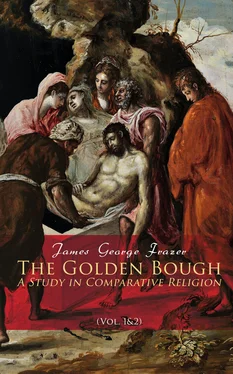Again, souls may be extracted from their bodies or detained on their wanderings not only by ghosts and demons but also by men, especially by sorcerers. In Fiji if a criminal refused to confess, the chief sent for a scarf with which “to catch away the soul of the rogue.” At the sight, or even at the mention of the scarf the culprit generally made a clean breast. For if he did not, the scarf would be waved over his head till his soul was caught in it, when it would be carefully folded up and nailed to the end of a chief's canoe; and for want of his soul the criminal would pine and die.449 The sorcerers of Danger Island used to set snares for souls. The snares were made of stout cinet, about fifteen to thirty feet long, with loops on either side of different sizes, to suit the different sizes of souls; for fat souls there were large loops, for thin souls there were small ones. When a man was sick against whom the sorcerers had a grudge, they set up these soul-snares near his house and watched for the flight of his soul. If in the shape of a bird or an insect it was caught in the snare the man would infallibly die.450 Among the Sereres of Senegambia, when a man wishes to revenge himself on his enemy he goes to the Fitaure (chief and priest in one), and prevails on him by presents to conjure the soul of his enemy into a large jar of red earthenware, which is then deposited under a consecrated tree. The man whose soul is shut up in the jar soon dies.451 Some of the Congo negroes think that enchanters can get possession of human souls, and enclosing them in tusks of ivory, sell them to the white man, who makes them work for him in his country under the sea. It is believed that very many of the coast labourers are men thus obtained; so when these people go to trade they often look anxiously about for their dead relations. The man whose soul is thus sold into slavery will die “in due course, if not at the time.”452
In Hawaii there were sorcerers who caught souls of living people, shut them up in calabashes, and gave them to people to eat. By squeezing a captured soul in their hands they discovered the place where people had been secretly buried.453 Amongst the Canadian Indians, when a wizard wished to kill a man, he sent out his familiar spirits, who brought him the victim's soul in the shape of a stone or the like. The wizard struck the soul with a sword or an axe till it bled profusely, and as it bled the man to whom it belonged languished and died.454 In Amboina if a doctor is convinced that a patient's soul has been carried away by a demon beyond recovery, he seeks to supply its place with a soul abstracted from another man. For this purpose he goes by night to a house and asks, “Who's there?” If an inmate is incautious enough to answer, the doctor takes up from before the door a clod of earth, into which the soul of the person who replied is believed to have passed. This clod the doctor lays under the sick man's pillow, and performs certain ceremonies by which the stolen soul is conveyed into the patient's body. Then as he goes home the doctor fires two shots to frighten the soul from returning to its proper owner.455 A Karen wizard will catch the wandering soul of a sleeper and transfer it to the body of a dead man. The latter, therefore, comes to life as the former dies. But the friends of the sleeper in turn engage a wizard to steal the soul of another sleeper, who dies as the first sleeper comes to life. In this way an indefinite succession of deaths and resurrections is supposed to take place.456
The Indians of the Nass River, British Columbia, think that a doctor may swallow his patient's soul by mistake. A doctor who is believed to have done so is made by the other doctors to stand over the patient, while one of them thrusts his fingers down the doctor's throat, another kneads him in the stomach with his knuckles, and a third slaps him on the back. If the soul is not in him after all, and if the same process has been repeated upon all the doctors without success, it is concluded that the soul must be in the head-doctor's box. A party of doctors, therefore, waits upon him at his house and requests him to produce his box. When he has done so and arranged its contents on a new mat, they take him and hold him up by the heels with his head in a hole in the floor. In this position they wash his head, and “any water remaining from the ablution is taken and poured upon the sick man's head.”457
Other examples of the recall and recovery of souls will be found referred to beneath.458
But the spiritual dangers I have enumerated are not the only ones which beset the savage. Often he regards his shadow or reflection as his soul, or at all events as a vital part of himself, and as such it is necessarily a source of danger to him. For if it is trampled upon, struck, or stabbed, he will feel the injury as if it were done to his person; and if it is detached from him entirely (as he believes that it may be) he will die. In the island of Wetar there are magicians who can make a man ill by stabbing his shadow with a pike or hacking it with a sword.459 After Sankara had destroyed the Buddhists in India, it is said that he journeyed to Nepaul, where he had some difference of opinion with the Grand Lama. To prove his supernatural powers, he soared into the air. But as he mounted up, the Grand Lama, perceiving his shadow swaying and wavering on the ground, struck his knife into it and down fell Sankara and broke his neck.460 In the Babar Islands the demons get power over a man's soul by holding fast his shadow, or by striking and wounding it.461 There are stones in Melanesia on which, if a man's shadow falls, the demon of the stone can draw out his soul.462 In Amboina and Uliase, two islands near the equator, and where, therefore, there is little or no shadow cast at noon, it is a rule not to go out of the house at mid-day, because it is supposed that by doing so a man may lose the shadow of his soul.463 The Mangaians tell of a mighty warrior, Tukaitawa, whose strength waxed and waned with the length of his shadow. In the morning, when his shadow fell longest, his strength was greatest; but as the shadow shortened towards noon his strength ebbed with it, till exactly at noon it reached its lowest point; then, as the shadow stretched out in the afternoon, his strength returned. A certain hero discovered the secret of Tukaitawa's strength and slew him at noon.464 It is possible that even in lands outside the tropics the fact of the diminished shadow at noon may have contributed, even if it did not give rise, to the superstitious dread with which that hour has been viewed by various peoples, as by the Greeks, ancient and modern, and by the Roumanians of Transylvania.465 In this fact, too, we may perhaps detect the reason why noon was chosen by the Greeks as the hour for sacrificing to the shadowless dead.466 The ancients believed that in Arabia if a hyaena trod on a man's shadow it deprived him of the power of speech and motion; and that if a dog, standing on a roof in the moonlight, cast a shadow on the ground and a hyaena trod on it, the dog would fall down as if dragged with a rope.467 Clearly in these cases the shadow, if not equivalent to the soul, is at least regarded as a living part of the man or the animal, so that injury done to the shadow is felt by the person or animal as if it were done to his body. Whoever entered the sanctuary of Zeus on Mount Lycaeus in Arcadia was believed to lose his shadow and to die within the year.468 Nowhere, perhaps, does the equivalence of the shadow to the life or soul come out more clearly than in some customs practised to this day in South-Eastern Europe. In modern Greece, when the foundation of a new building is being laid, it is the custom to kill a cock, a ram, or a lamb, and to let its blood flow on the foundation stone, under which the animal is afterwards buried. The object of the sacrifice is to give strength and stability to the building. But sometimes, instead of killing an animal, the builder entices a man to the foundation stone, secretly measures his body, or a part of it, or his shadow, and buries the measure under the foundation stone; or he lays the foundation stone upon the man's shadow. It is believed that the man will die within the year.469 The Bulgarians still observe a similar custom. If they cannot get a human shadow they measure the shadow of the first animal that comes that way.470 The Roumanians of Transylvania think that he whose shadow is thus immured will die within forty days; so persons passing by a building which is in course of erection may hear a warning cry, “Beware lest they take thy shadow!” Not long ago there were still shadow-traders whose business it was to provide architects with the shadows necessary for securing their walls.471 In these cases the measure of the shadow is looked on as equivalent to the shadow itself, and to bury it is to bury the life or soul of the man, who, deprived of it, must die. Thus the custom is a substitute for the old custom of immuring a living person in the walls, or crushing him under the foundation stone of a new building, in order to give strength and durability to the structure.
Читать дальше












